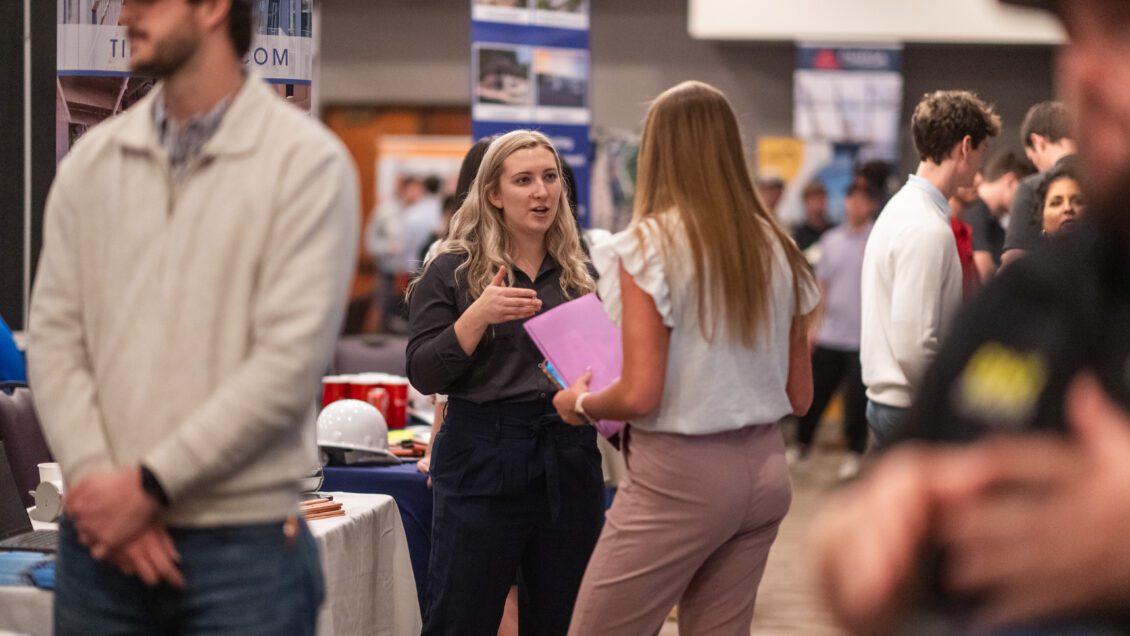Clemson has offered the highest standard of construction education for six decades. For the past ten years and counting, the Nieri Department of Construction, Development and Planning has enjoyed a 100 percent job placement rate for its undergraduate construction science and management (CSM) majors. A key element of that success has been its biannual career fairs, which on February 15 drew more than 90 companies to Clemson University.
“The competition for students is fierce,” said Brad Hutto, vice president of operations at Holder Construction and chair of the Department’s Industry Advisory Board.
Supply and demand
To put the demand for students into perspective, the construction science and management major has approximately 90 seniors—one future graduate for each company represented at the fair. Because the fair is only open to members of the Department’s corporate partner program, each one paid at least $5,000 just to attend and have a chance to recruit one of Clemson’s elite construction science students.
“The industry demand far exceeds what the university systems are able to provide, quite frankly,” Hutto noted.
The sky-high demand for graduates is a dream for graduating seniors like Gracie Crosby. She has already secured a job after graduation with Trident Construction as a project engineer, and she met her future boss at the career fair when she was just a sophomore, leading to two internships with Trident.
“I have friends who struggle to just find an internship because their programs just don’t have what we have,” Crosby explained. “Our department faculty sets us up for success. They use very practical examples in their teaching, and they always relate it to the industry.”
Senior Rhame Honeycutt’s experience was similar. As a sophomore, he met with CSM alumnus Michael Benko ’19 at the career fair, who recruited him to a position with Thompson Turner Construction.
“I got really close with him, he graduated from the same program I did and took all the same coursework, so he’s a great mentor for me, not only professionally, but outside of the workplace as well,” Honeycutt said. Honeycutt’s two internships with the company in addition to the mentorship opportunities, gave him insight into the culture of where he wanted to work.
Pathways to a career
Although Crosby and Honeycutt—both from the Charleston area—have similar plans after graduation, their college paths reflect the very different ways students achieve success as construction science and management majors.
Crosby is following the same path she has been on since childhood.
“I kind of grew up on a construction site,” she said, noting that her parents were homebuilders. She enrolled via Tri-County Technical College’s Bridge to Clemson program, and said that majoring in construction science was always the plan. Not lacking for job options, she chose Trident in part because she could work close to home.
“They have a great culture and a great team surrounding them,” she added.
Honeycutt, like about half of the program’s seniors, arrived at Clemson unsure of what career he would pursue, and initially enrolled in an engineering program.
“I realized that wasn’t my path,” he recalled. “It wasn’t something I wanted to take into a career, so I utilized the Michelin Career Center, and I met with several mentors who led me to this sort of project management career.”
Once enrolled in the CSM program, Honeycutt thrived, serving as a student ambassador for the College of Architecture, Art and Construction and events coordinator for the Clemson Constructor’s Guild.
“I think our program does a great job of building leaders,” he reflected. “The exposure to other people in the industry is amazing, that’s why I think it was the best option for me, especially to enhance my leadership abilities.”
Skill and culture
“If you show up, work hard, and work well with others, that’s the kind of people we want,” Hutto explained. He noted that Clemson provides students with the foundational knowledge of the industry, but that employers invest in skill development for specific jobs, so cultural fit is of paramount importance.
Mike Jackson, chair of the Nieri Department of Construction, Development and Planning, pointed out that the tight relationship between the Department and its Industry Advisory Board has made it possible to match students with jobs in which they can succeed.
“I can’t say enough about how supportive our corporate partners are for our students,” Jackson said. “We try to ensure that the transition from college to industry is seamless for our majors, and our corporate sponsors make that possible. From the minute our students enter our program, they belong not just to the Clemson Family, but to a thriving construction community that is going to invest in their future.”
He and Hutto both noted that the Department has been trying to meet industry demand for students with creative course offerings and scheduling, as the only constraint on the program’s growth is limited space.
“From a career standpoint, you can make great money, you get to work with awesome people, and you get to build amazing things, and for me that’s very rewarding and I hope that others find it rewarding too,” Hutto said.
Get in touch and we will connect you with the author or another expert.
Or email us at news@clemson.edu

